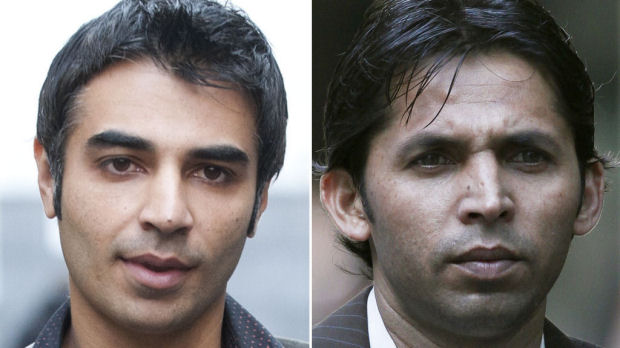Pakistani cricketers guilty of spot-fixing scam
Former Pakistan cricket captain Salman Butt and fast bowler Mohammad Asif have been found guilty of conspiracy to cheat and accepting corrupt payments.
The maximum penalties are seven years in prison for accepting payments and two years for cheating.
The pair were charged after an undercover reporter recorded sports agent Mazhar Majeed boasting of how he could arrange for Pakistan players to rig games for money, Southwark Crown Court heard.
Over three weeks of evidence, the jury of six men and six women heard that there are huge sums to be made by fixing cricket matches for gambling syndicates.
Sportsmen are more likely to be persuaded to spot fix because there is the attitude of ‘it’s only one no-ball, not losing the whole match.’ Dr Bibhas Saha
The allegations emerged after the now-defunct News of the World approached Majeed in August last year posing as a wealthy Indian businessman seeking major international cricketers for a tournament.
Majeed claimed he had been carrying out match-fixing for two and a half years, had seven players from Pakistan’s national side working for him, and had made “masses and masses of money”.
Prosecutors had alleged that Butt and Asif conspired with Majeed and Pakistan fast bowler Mohammad Amir to deliver three intentional no-balls during the Lord’s Test between Pakistan and England from 26-29 August last year.
Major development
Dr Bibhas Saha of UEA’s School of Economics, an expert in match fixing and spot fixing, told Channel 4 News that the landmark ruling respresented a massive development in the fight to eradicate spot fixing and match fixing in sports.
“It is fantastic news, because this is the first instance of this kind of fixing in a court of law, and it will act as deterrence to players in all sports,” he said.

“This should improve spot fixing in the sport and viewers of the sport will now know that there is a greater deal of integrity in the game.”
Dr Saha said that spot fixing is now being a much more prevalent scam than match fixing in sports betting, because it is harder to detect.
“What we have seen in the evolution of illegal betting is two things; the rise in spot fixing, and match fixing only really occuring in non-high profile matches or those unlikely to be closely contested.
“Not only is it easier to get away with, for example, missing a single shot in snooker than throwing an entire game in a soccer match, but there are also so many more betting opportunities in spot fixing.
“On top of that, I think that sportsmen would be more likely to be persuaded to get involved in sport fixing, because there is the attitude of ‘it’s only one no-ball, not losing the whole match.'”
Read more: Pakistani cricketer seeks asylum in UK
Despite being found guilty, Pakistan’s cricket fans may react angrily to the news, said Dr Saha.
“These two players have been singularly identified, and (the fans) will believe that this is not an isolated incident and not just something which has occurred in Pakistan. They will feel that their players have been humiliated and that their country was specifically targeted.”
But he added that the blow would not be as great if other Pakistani cricketers involved, because “Butt and Asif are not considered to be legends or idols of the team”.
Dr Saha said that despite intensive efforts by the International Cricket Council (ICC) to stamp out betting scams in the sport, such activity in the subcontinent continues to prove difficult to wipe out.
“The governments need to legalise betting, because presently, people can only bet on horse racing and straight lottery. There is of course no guarantee that this will stop match fixing entirely, but what it allows authorities to monitor betting, and gives them a recourse for legal action.”
-
Latest news
-
As India goes to the polls in the world’s largest election – what do British-Indians think?6m

-
Tees Valley: Meet the candidates in one of the biggest contests coming up in May’s local elections4m

-
Keir Starmer says public sector reform will be a struggle7m

-
Nicola Sturgeon’s husband Peter Murrell charged with embezzlement of funds from SNP1m

-
Ukraine might finally get $60billion in American weapons and assistance to defend against Russia3m

-




